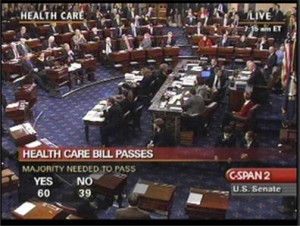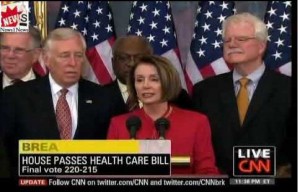We are incredibly close to making health insurance reform a reality in this country. Our challenge now is to finish the job.
 This was how President Obama heralded the Christmas-eve passage of healthcare legislation in the US Senate, which emulated the early-November passage of similar legislation in the House. Now he’s banking on members of the Democratic-controlled House and Senate being able to reconcile the putatively irreconcilable provisions of their respective bills.
This was how President Obama heralded the Christmas-eve passage of healthcare legislation in the US Senate, which emulated the early-November passage of similar legislation in the House. Now he’s banking on members of the Democratic-controlled House and Senate being able to reconcile the putatively irreconcilable provisions of their respective bills.
The HOPE, of course, is that he will be able to sign a reconciled bill before he delivers the annual State of the Union Address next month, enabling Obama to fulfill his promise to pass this centerpiece of his domestic agenda before the end of his first year in office.
 There’s no denying, however, that this historic accomplishment will be undermined by the fact that it was enacted on party-line votes in both chambers. Not to mention that many of these votes (particularly in the Senate) were bought and paid for in an all-too transparent bartering process that gave credence to the adage that watching legislation being enacted is rather like watching sausage being made.
There’s no denying, however, that this historic accomplishment will be undermined by the fact that it was enacted on party-line votes in both chambers. Not to mention that many of these votes (particularly in the Senate) were bought and paid for in an all-too transparent bartering process that gave credence to the adage that watching legislation being enacted is rather like watching sausage being made.
This debate was supposed to produce a bill that reformed health care in America. Instead, we’re left with party-line votes in the middle of the night, a couple of sweetheart deals to get it over the finish line, and a public that’s outraged.
(Republican leader, Sen Mitch McConnell, R-Ky)
Yet there’s also no denying that, no matter its partisan nature, final provisions or ultimate cost (est. $871 billion), this bill will be considered every bit as significant and transformative as the passage of Social Security if it delivers on Obama’s core principles of healthcare reform: making insurance affordable for over 30 million uninsured Americans, eliminating pre-existing medical conditions as a disqualifier for insurance coverage and reducing the deficit.
Also, key provisions in a reconciled bill are expected to eliminate co-payments and deductibles on preventive services, including physical examinations, immunizations, and mammograms, as well as bar insurers from dropping beneficiaries when they become sick and from imposing lifetime limits on coverage.
When people learn what’s actually in the bill and all the good it does, it is going to become more and more popular.
(Sen Chuck Schumer D-NY)
Moreover, I fully expect Congress to pass a timely bill that delivers on Obama’s principles. This, despite calls by Democratic ideologues to kill it if it does not ultimately deliver on all of their principles (including, most notably, a government-run public option for insurance coverage, which they are convinced is the only way to break the monopoly of private insurance companies).
 Meanwhile, nothing demonstrates the cynicism and partisanship that now characterizes politics in America quite like the fact that Republicans have remained unified in their perverse determination to just say no to any healthcare bill, no matter its principles and provisions.
Meanwhile, nothing demonstrates the cynicism and partisanship that now characterizes politics in America quite like the fact that Republicans have remained unified in their perverse determination to just say no to any healthcare bill, no matter its principles and provisions.
Even worse, it is patently clear that Republicans have calculated that it is far more important to oppose healthcare reform – in the vain hope of positioning themselves for big gains in mid-term elections next year, than it is to support it – in the salutary hope of providing millions of Americans a chance to gain healthcare coverage for life.
 At any rate, the enactment of this healthcare legislation will vindicate what I always knew would be the triumph of Obama’s pragmatism over the idealism of left-wing members in his party:
At any rate, the enactment of this healthcare legislation will vindicate what I always knew would be the triumph of Obama’s pragmatism over the idealism of left-wing members in his party:
I’m sure the congenitally pragmatic Obama will have a moderating influence on Congressional Democrats, which will prevent them from pursuing a radical … agenda that could undermine his presidency….)
[… Bad omen for Republicans, TIJ, October 28, 2008]
Finally, you’ve no doubt heard Republicans expressing righteous indignation about costs. Their professed concerns, however, would be a little more credible if these very same Republicans were not so blithely unconcerned when President George W. Bush was running up trillions of dollars in debt – funding tax breaks for the rich and fighting an ill-advised, if not illegal, war in Iraq.
And, as Obama duly noted, seven US presidents have tried and failed to sign similar legislation since Theodore Roosevelt proposed universal healthcare coverage in 1912.
So here’s to Obama making history; especially for the sake of tens of millions of poor, uninsured Americans.
Related commentaries:
Bad omen for Republicans
Leave a Reply
You must be logged in to post a comment.